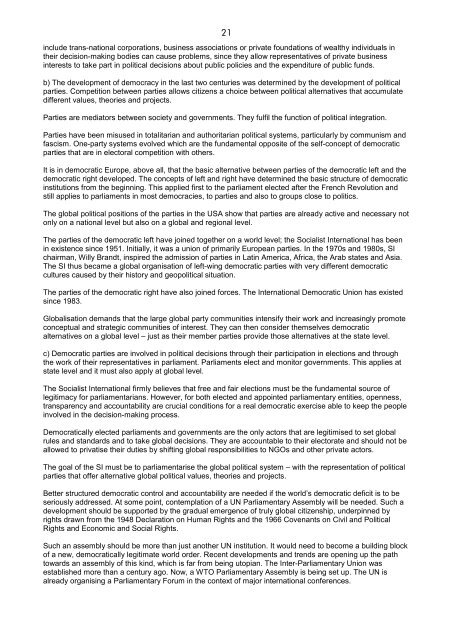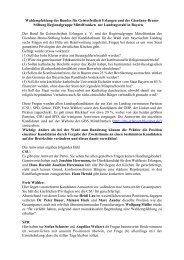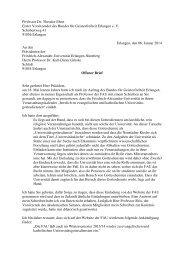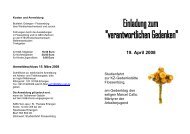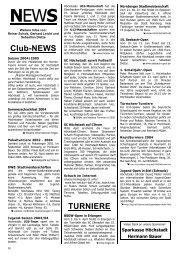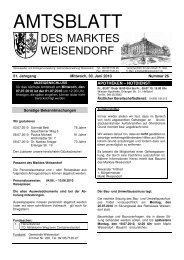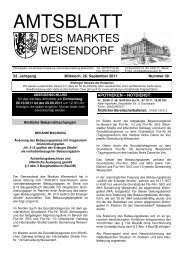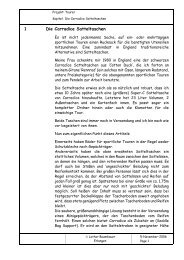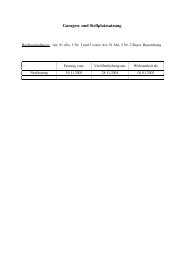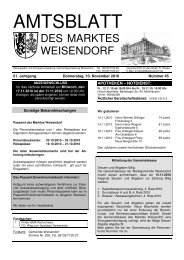Globalisierung - Realität und Ideologie.pdf - FEN
Globalisierung - Realität und Ideologie.pdf - FEN
Globalisierung - Realität und Ideologie.pdf - FEN
Erfolgreiche ePaper selbst erstellen
Machen Sie aus Ihren PDF Publikationen ein blätterbares Flipbook mit unserer einzigartigen Google optimierten e-Paper Software.
include trans-national corporations, business associations or private fo<strong>und</strong>ations of wealthy individuals in<br />
their decision-making bodies can cause problems, since they allow representatives of private business<br />
interests to take part in political decisions about public policies and the expenditure of public f<strong>und</strong>s.<br />
21<br />
b) The development of democracy in the last two centuries was determined by the development of political<br />
parties. Competition between parties allows citizens a choice between political alternatives that accumulate<br />
different values, theories and projects.<br />
Parties are mediators between society and governments. They fulfil the function of political integration.<br />
Parties have been misused in totalitarian and authoritarian political systems, particularly by communism and<br />
fascism. One-party systems evolved which are the f<strong>und</strong>amental opposite of the self-concept of democratic<br />
parties that are in electoral competition with others.<br />
It is in democratic Europe, above all, that the basic alternative between parties of the democratic left and the<br />
democratic right developed. The concepts of left and right have determined the basic structure of democratic<br />
institutions from the beginning. This applied first to the parliament elected after the French Revolution and<br />
still applies to parliaments in most democracies, to parties and also to groups close to politics.<br />
The global political positions of the parties in the USA show that parties are already active and necessary not<br />
only on a national level but also on a global and regional level.<br />
The parties of the democratic left have joined together on a world level; the Socialist International has been<br />
in existence since 1951. Initially, it was a union of primarily European parties. In the 1970s and 1980s, SI<br />
chairman, Willy Brandt, inspired the admission of parties in Latin America, Africa, the Arab states and Asia.<br />
The SI thus became a global organisation of left-wing democratic parties with very different democratic<br />
cultures caused by their history and geopolitical situation.<br />
The parties of the democratic right have also joined forces. The International Democratic Union has existed<br />
since 1983.<br />
Globalisation demands that the large global party communities intensify their work and increasingly promote<br />
conceptual and strategic communities of interest. They can then consider themselves democratic<br />
alternatives on a global level – just as their member parties provide those alternatives at the state level.<br />
c) Democratic parties are involved in political decisions through their participation in elections and through<br />
the work of their representatives in parliament. Parliaments elect and monitor governments. This applies at<br />
state level and it must also apply at global level.<br />
The Socialist International firmly believes that free and fair elections must be the f<strong>und</strong>amental source of<br />
legitimacy for parliamentarians. However, for both elected and appointed parliamentary entities, openness,<br />
transparency and accountability are crucial conditions for a real democratic exercise able to keep the people<br />
involved in the decision-making process.<br />
Democratically elected parliaments and governments are the only actors that are legitimised to set global<br />
rules and standards and to take global decisions. They are accountable to their electorate and should not be<br />
allowed to privatise their duties by shifting global responsibilities to NGOs and other private actors.<br />
The goal of the SI must be to parliamentarise the global political system – with the representation of political<br />
parties that offer alternative global political values, theories and projects.<br />
Better structured democratic control and accountability are needed if the world’s democratic deficit is to be<br />
seriously addressed. At some point, contemplation of a UN Parliamentary Assembly will be needed. Such a<br />
development should be supported by the gradual emergence of truly global citizenship, <strong>und</strong>erpinned by<br />
rights drawn from the 1948 Declaration on Human Rights and the 1966 Covenants on Civil and Political<br />
Rights and Economic and Social Rights.<br />
Such an assembly should be more than just another UN institution. It would need to become a building block<br />
of a new, democratically legitimate world order. Recent developments and trends are opening up the path<br />
towards an assembly of this kind, which is far from being utopian. The Inter-Parliamentary Union was<br />
established more than a century ago. Now, a WTO Parliamentary Assembly is being set up. The UN is<br />
already organising a Parliamentary Forum in the context of major international conferences.


